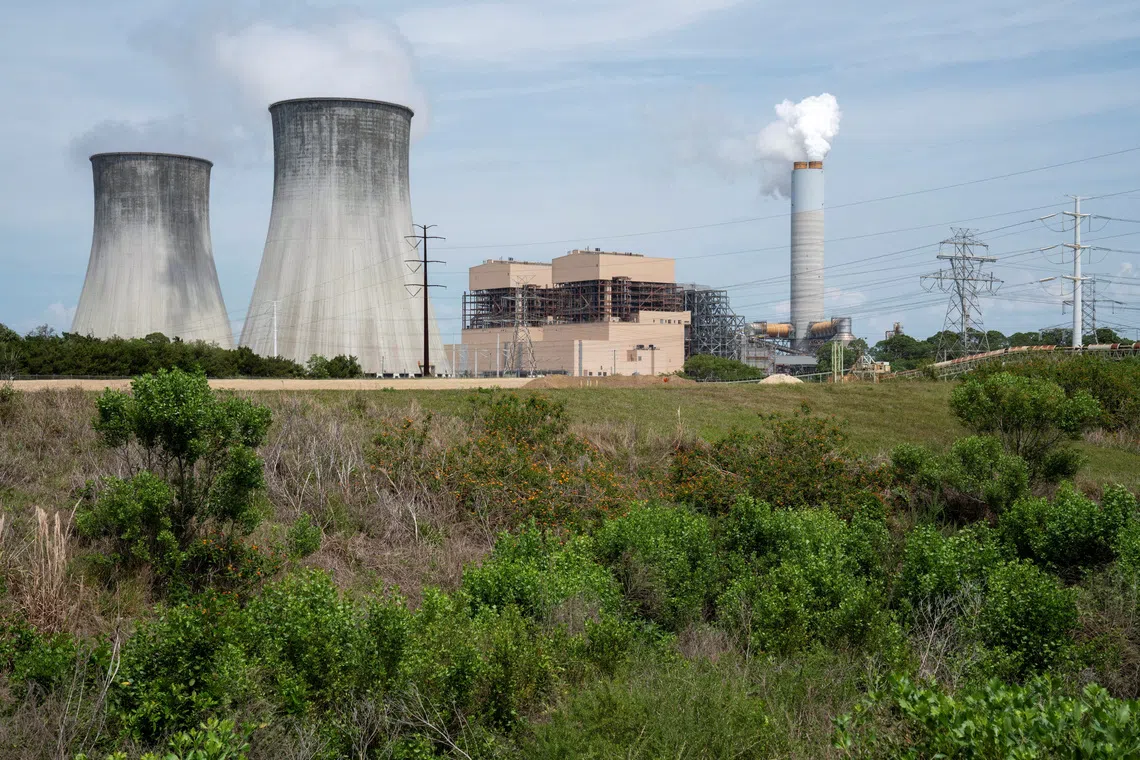China steps into spotlight at UN climate talks
Sign up now: Get ST's newsletters delivered to your inbox

China is responsible for about 30 per cent of global greenhouse gas emissions from its factories, power plants, vehicles and more.
PHOTO: REUTERS
UNITED NATIONS - China’s emissions-cutting pledge is poised to take centre stage at a UN climate meeting on Sept 24, after US President Donald Trump unleashed a blistering – if predictable – broadside against the science surrounding planet-warming fossil fuels.
Some 118 nations will outline plans to curb global warming, which is driving disasters worldwide – from catastrophic floods in Pakistan to raging wildfires in Spain – even as many continue expanding oil and gas operations.
Chinese Premier Li Qiang will open the gathering at the UN headquarters in New York.
His country – responsible for about 30 per cent of global greenhouse gas emissions, from its factories, power plants, vehicles and more – is expected to deliver a crucial update: its 2035 emissions-cutting target.
China has never committed to reducing carbon dioxide outright. Instead, it pledged to peak emissions before 2030 – a goal it appears set to meet five years early, thanks to rapid growth in solar energy and electric cars.
Most wealthy nations, historically the biggest contributors to global warming, peaked decades ago but still lack credible plans to reach carbon neutrality by 2050.
“All eyes will be on China,” Mr Li Shuo, an expert at the Asia Society think-tank who is well connected in Beijing, told AFP.
Under-promise, overdeliver
He expects a “single-digit to low double-digit” percentage reduction commitment over the next decade, similar to the pace the US and European Union achieved in the 10 years after their own peaks.
That trajectory would fall well short of what is needed to limit warming to 1.5 deg C above pre-industrial levels – the target set by the 2015 Paris Agreement to avoid the worst climate catastrophes.
Still, presenting a target ahead of COP30 – the 2025 main climate gathering in Belem, Brazil – will signal China’s commitment to the international process, even as the US under President Trump champions fossil fuels and the EU struggles to unite around its blueprint.
In any case, Mr Li warned, focusing too much on the figure risks obscuring the fact that “China has already become the green-tech superpower of the world”, and is widely expected to under-promise but overdeliver.
For this UN summit, Secretary-General Antonio Guterres invited only countries ready to present or announce a new 2035 climate goal.
Under the Paris accord – which nearly every country is part of, except Iran, Libya, and soon the US – nations freely set their own targets but must strengthen them every five years.
Most are behind schedule, notably the EU, where several states fear moving too fast could hurt industry.
France, for example, faces shaky finances and political turmoil, and wants more clarity on investment frameworks before committing to deeper decarbonisation.
“There’s a current shortfall in ambition demonstrated by the countries that we traditionally look to for leadership (that) are acting more like climate laggards,” said Palau’s Ambassador to the UN and chair of the Alliance of Small Island States Ilana Seid.
Catastrophism v hope
The UN is trying to strike a balance between warning of catastrophe and maintaining hope.
On the one hand, Mr Guterres told AFP last week that chances of limiting warming to 1.5 deg C are on the verge of “collapsing”, a view echoed by climatologists, with current temperatures already about 1.4 deg C above pre-industrial levels.
On the other hand, UN climate change executive secretary Simon Stiell insists the Paris process is working.
“Without UN climate cooperation, we were heading for 5 deg C of heating – an impossible future,” he told a gathering at the annual Climate Week in New York earlier this week.
“Today we are closer to 3 deg C. Still too high – but bending the curve.”
Part of that progress stems from China. A decade ago, three-quarters of its electric mix came from coal – a figure now down to half. Its booming exports of solar panels, batteries and electric cars are cutting emissions abroad as well. AFP


